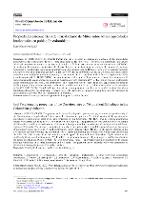Psychometric properties of the Questionnaire of Myths about Giftedness in the Colombian population
Abstract
INTRODUCTION: The present work shows the adaptation process and psychometric properties study of the Questionnaire of myths about Giftedness in the Colombian population. The initial version of the questionnaire consisted of a dichotomous scale of 20 items structured in four dimensions. METHOD: Two descriptive quantitative studies were carried out using a cross-sectional survey methodology. The questionnaire was applied at first to a sample of 160 teachers; and in a second moment, 424 teachers from public and private educational institutions from different regions of Colombia. The data were subjected to a study of internal consistency and the factorial structure by means of exploratory factor analysis (EFA) and confirmatory factor analysis (CFA). RESULTS: The results obtained in the EFA made it possible to reduce the questionnaire to 18 items, maintaining four dimensions, which were tested using the CFA. The final version of the instrument was made up of 15 items and three dimensions: Myths related to the profile of giftedness and achievements; Myths related to social adaptation and physical aspects; and Myths related to the nature of giftedness. DISCUSSION: The three-dimensional model is appropriate with high goodness-of-fit indices and high reliabilities in all three dimensions and full scale. This questionnaire is a reliable tool for the assessment of false beliefs about giftedness in Colombian teachers. INTRODUCCIÓN: El presente trabajo muestra el proceso de adaptación y estudio de las propiedades
psicométricas del Cuestionario de mitos sobre altas capacidades intelectuales en población colombiana. La versión
inicial del cuestionario constaba de una escala dicotómica de 20 ítems estructurados en cuatro dimensiones. MÉTODO:
Se realizaron dos estudios cuantitativos de alcance descriptivo mediante una metodología de encuesta de carácter
transversal. El cuestionario se aplicó en un primer momento a una muestra de 160 profesores; y en un segundo momento
a 424 profesores de instituciones educativas públicas y privadas de diferentes regiones de Colombia. Los datos fueron
sometidos a un estudio de consistencia interna y de la estructura factorial mediante análisis factorial exploratorio (AFE)
y confirmatorio (AFC). RESULTADOS: Los resultados obtenidos en el AFE permitieron reducir el cuestionario a 18
ítems manteniendo cuatro dimensiones, que se pusieron a prueba mediante el AFC. La versión final del instrumento
quedó conformada por 15 ítems y tres dimensiones: Mitos relacionados con el perfil de las altas capacidades intelectuales
(ACI) y logros; Mitos relacionados con la adaptación social y aspectos físicos; y Mitos relacionados con la naturaleza
de las ACI. DISCUSIÓN: El modelo de tres dimensiones es apropiado con unos índices de bondad de ajuste elevados y
fiabilidades altas en las tres dimensiones y escala total. Este cuestionario es una herramienta fiable para la valoración de
falsas creencias sobre las ACI en el profesorado colombiano.
Citar como
Gutiérrez Ruiz K. (2022). Propiedades psicométricas del Cuestionario de Mitos sobre Altas Capacidades Intelectuales en población colombiana. Revista Complutense de Educación, 33(4), 667-677. https://doi.org/10.5209/rced.76486Collections
- Productos de investigación [1453]
Compatible para recolección con:

Archivos
The following license files are associated with this item:
Universidad Tecnológica de Bolívar - 2017 Institución de Educación Superior sujeta a inspección y vigilancia por el Ministerio de Educación Nacional. Resolución No 961 del 26 de octubre de 1970 a través de la cual la Gobernación de Bolívar otorga la Personería Jurídica a la Universidad Tecnológica de Bolívar.













